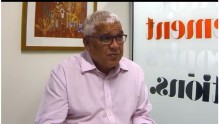The over-incarceration of Aboriginal and Torres Strait Islander Peoples is a “public health catastrophe”, and Mick Gooda, the Aboriginal and Torres Strait Islander Social Justice Commissioner, plans to make it a priority issue for the remainder of his term.
At Croakey we are delighted that Mick Gooda is supporting our new crowd-funding campaign – #JustJustice -which aims to investigate and profile solutions to over-incarceration.
Gooda was a keynote speaker at a conference ‘Prison Health – From the Inside Out’, that kicked off yesterday in Geraldton, Western Australia, as featured in this ABC news report.
Sandy Davies, chairman of the Geraldton Aboriginal Medical Service, hopes the conference will identify alternatives to imprisonment for minor offences, and also lead to more effective strategies for improving prisoners’ health.
The conference continues today – follow the discussion on Twitter at #PrisonHealth and #JustJustice. Also follow live conference tweeting from @DameyonBonson and @WePublicHealth – who this week is Croakey moderator and journalist Marie McInerney.
****
Calling for leadership and action
Mick Gooda writes:
 Tackling the over-incarceration of Aboriginal and Torres Strait Islander peoples will require leadership and action at multiple levels.
Tackling the over-incarceration of Aboriginal and Torres Strait Islander peoples will require leadership and action at multiple levels.
We need to shift the dominant narrative, which suggests that “lock them up” policies produce safer communities.
This is not true. The evidence from around the world tells us that putting people in jail for minor crimes does not create safer communities. But it does create a cycle of incarceration that is tearing apart families and communities.
The mental health impacts of over-incarceration are devastating, affecting the social and emotional wellbeing of children, families and communities well into the future.
I am supporting the #JustJustice campaign because we need to encourage a public debate that is focused on ensuring effective, evidence-based solutions to over-incarceration.
Over-incarceration is not only a public health catastrophe; it is also a terrible waste of taxpayers’ money – imprisonment is not only ineffective, it’s terribly expensive.
Health sector can help
The health sector has an important role to play in this debate; much of the evidence developed by health researchers could help create a fairer criminal justice system.
For example we know from the health sector that having interpreters who are familiar with the health system can make a real difference for Aboriginal and Torres Strait Islander patients.
Similarly, interpreters who understand the criminal justice system can make a real difference. There are countless stories of people ending up in jail without understanding what’s just happened to them. If people don’t understand the charges they’re facing, how can they instruct their lawyers and get a proper defence?
We should also be looking at alternatives to imprisonment for unpaid fines.
Police services could also be learning from work in the health sector to improve the cultural competence of health professionals. We need to be talking with the police services around Australia about issues like unconscious bias, and my sense is that the time is right for these conversations.
Police need to be encouraged to exercise their discretion in the right way; because it is at that first contact point, the one between police and our mob, where the justice system is at its most flexible, as such, how they manage that first contact can often dictate how the rest of the system reacts.
For instance, deciding whether to issue cautions or what charges to lay means they are in positions to stop the cycle of incarceration from starting.
Justice Targets matter
At a national level, we need to have Justice Targets as part of the Closing the Gap agenda. We know that targets focus peoples’ attention and efforts.
We would like the Prime Minister to be talking about Justice Targets on the first sitting day of every Parliament, as he does now with other Closing the Gap Targets.
I will be working with the National Justice Coalition to progress justice targets. I hope the Government upholds its 2013 election promise to do the same.
Reducing the over-incarceration of Aboriginal and Torres Strait Islander peoples is one of the most important issues on my agenda for the remaining two years of my appointment.
I encourage the health sector engage in this issue of national importance. A fairer justice system will help to improve the health and social and emotional wellbeing of Aboriginal and Torres Strait Islander peoples. This is a crucial issue for children, for women, for men, for families, for communities.
I encourage Croakey readers and the wider health system to support the #JustJustice series, and to engage with addressing this critical public health issue.
• Mick Gooda is the Aboriginal and Torres Strait Islander Social Justice Commissioner.
*********************
• Please consider supporting the #JustJustice campaign. Some of the funds raised will go to community members, to help tell their stories about how over-incarceration is affecting the health and wellbeing of individuals, families and communities. More background is here.


